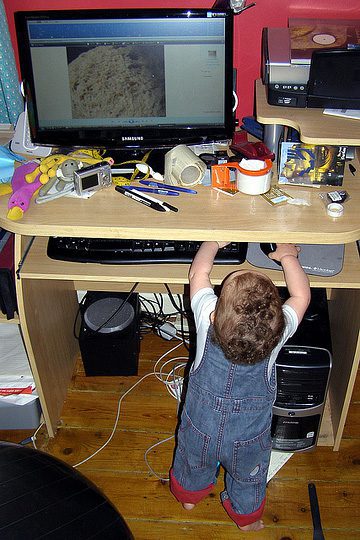Matt Ritchel, one of my favorite New York Times writers, has a new article entitled “Wasting Time Is the New Divide in Digital Era.” He explores some of the negative consequences of a national movement to get computers into the hands of everyone, especially all children. The article begins:

In the 1990s, the term “digital divide” emerged to describe technology’s haves and have-nots. It inspired many efforts to get the latest computing tools into the hands of all Americans, particularly low-income families.
Those efforts have indeed shrunk the divide. But they have created an unintended side effect, one that is surprising and troubling to researchers and policy makers and that the government now wants to fix.
As access to devices has spread, children in poorer families are spending considerably more time than children from more well-off families using their television and gadgets to watch shows and videos, play games and connect on social networking sites, studies show.
Here is some of the data:
A study published in 2010 by the Kaiser Family Foundation found that children and teenagers whose parents do not have a college degree spent 90 minutes more per day exposed to media than children from higher socioeconomic families. In 1999, the difference was just 16 minutes.
The study found that children of parents who do not have a college degree spend 11.5 hours each day exposed to media from a variety of sources, including television, computer and other gadgets. That is an increase of 4 hours and 40 minutes per day since 1999.
Yet, this is not to say that children with more educated parents are immune:
Children of more educated parents, generally understood as a proxy for higher socioeconomic status, also largely use their devices for entertainment. In families in which a parent has a college education or an advanced degree, Kaiser found, children use 10 hours of multimedia a day, a 3.5-hour jump since 1999. (Kaiser double counts time spent multitasking. If a child spends an hour simultaneously watching TV and surfing the Internet, the researchers counted two hours.)
And if a child is watching TV, surfing the Internet, and texting her friends, does this count as three hours?
Here’s the unhappy bottom line:
“Despite the educational potential of computers, the reality is that their use for education or meaningful content creation is minuscule compared to their use for pure entertainment,” said Vicky Rideout, author of the decade-long Kaiser study. “Instead of closing the achievement gap, they’re widening the time-wasting gap.”
Does any of this surprise you? It doesn’t surprise me. I suppose I should be surprised that those who were so committed to getting a computer in the hands of every child in America didn’t anticipate this. Do any of these government officials and bureaucrats have children? Or are they too busy fixing the rest of us to notice what their own children are doing?
A few thoughts:
1. This article doesn’t deal with the potential downside for brain development of multitasking, that which often goes hand-in-hand with digital multimedia. In other words, the situation may be even worse.
2. I’m not sure I would classify texting or spending time on Facebook as “pure entertainment.” I’m not saying this practice is as educational as reading the Encyclopaedia Britannica (oops, no longer in print). But there is a potential for learning in socialization when one uses Facebook and other forms of social media. Okay, okay, I’m looking pretty hard for a silver lining here.
3. The biggest problem, according to the article, is not the presence of a computer in the hands of a child, but rather the lack of parent supervision. Once again, we find that the lack of parental involvement in the lives of children is a problem. Nothing new here. According to Danah Boyd, a senior researcher at Microsoft, digital access “Not only does it not solve problems, it mirrors and magnifies existing problems we’ve been ignoring.” Bingo!











